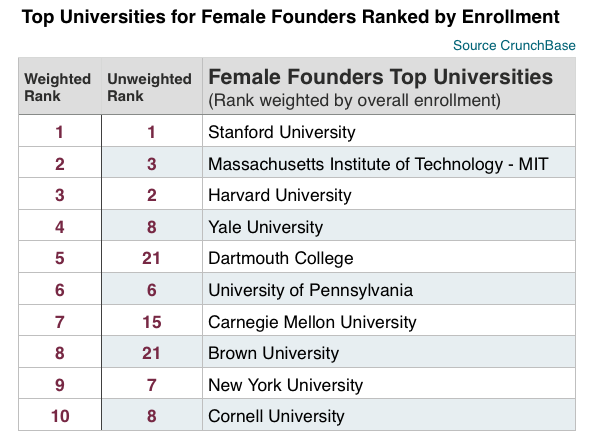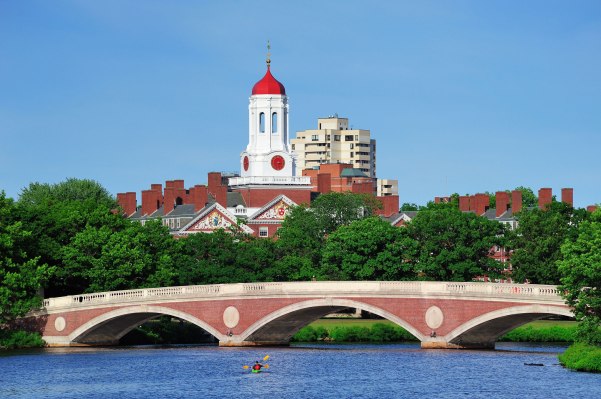Editor’s note: Gené Teare (@geneteare), a past female founder, heads up the CrunchBase Venture Program and CrunchBase’s data work. Ned Desmond (@neddesmond) is the COO of TechCrunch and CrunchBase. Cory Cox, an analyst at CrunchBase, contributed to this post.
CrunchBase Female Founders Study (Part 2)
In May this year, CrunchBase published its first report on female founders, which found that the percentage of female founders among VC-funded companies nearly doubled between 2009 and 2014. In the conclusion of that report, we promised to dig deeper into CrunchBase data to understand better what was driving this favorable trend. For our next step, we decided to look at the educational backgrounds of women founders to determine which universities and majors or graduate programs are most strongly represented among women founders.
Our data sample consists of the 3,616 female founders in CrunchBase whose companies have received funding since 2009.(1) We use funding, whether it’s large or small, as a rough quality filter to ensure that the startups in our data sample have gained some traction. 72% of these companies are US-based. Where necessary, our research team filled in any self-reporting gaps on the educational details for female founders. In our data set, we found that 99% of female founders had completed their undergraduate degree.
When we were tallying the founder count for each university, we decided to lump together graduate and under-graduate degrees. If a founder had a degree from two different universities — for example, an undergraduate degree from Harvard and a graduate degree from Stanford — we credited each university once.
As you can see in the list below, Stanford and Harvard universities came out in a virtual dead heat for first place, with 236 and 235 female founders, respectively, to their credit. (Only 16 of those founders, to our surprise, claim a degree from both universities. )
MIT, the University of California (Berkeley), and Columbia University round out the top five.
These rankings are not weighted by the size of each institution. If we take that into account, the rankings change significantly.(2)
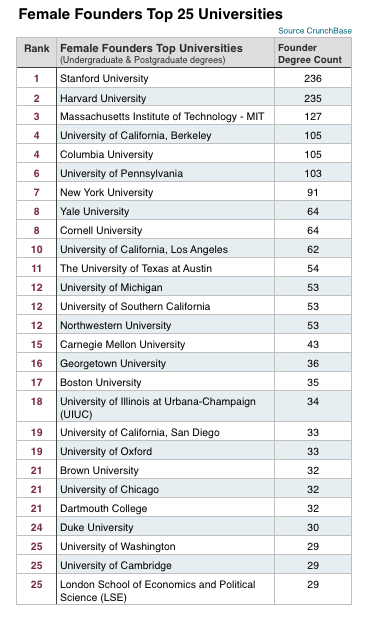
This ranking lends itself to many interesting observations. Here are a few that jump out.
- The top five schools account for only about 15% of female founders. There is a long list of universities producing notable numbers of female founders.
- Three British institutions, Oxford University, Cambridge University and the London School of Economics, made the top 25 — despite the fact that nearly three-quarters of the companies in our study are U.S.-based.
- On a regional basis, the northeast and western regions of the US. have the most schools on the list (11 and 6, respectively) and largest number of graduates who went on to become female founders (913 and 518, respectively). Illinois is the powerhouse of the midwest, with three of the four mid-western schools in the top 25. Midwestern schools show 172 female graduates who went on to become founders. The south is the weakest region, with the lowest number of schools (3) and female founder graduates (120).
- All but one Ivy League university is in the top 25, and here’s a breakout of their ranking.
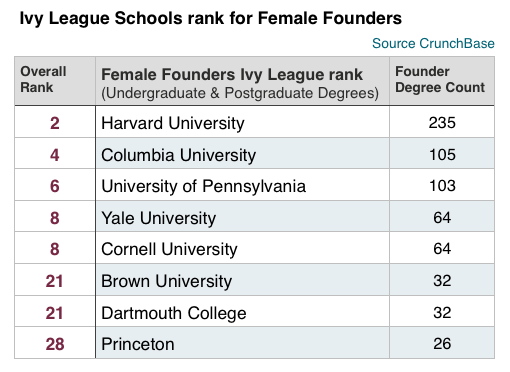
Top Schools for Female Vs. Male Founders
We also looked at how the top schools for male founders compared. It is no big surprise that the top schools were virtually the same. But as you can see below, there were many cases where schools ranked more strongly for female founders than male. New York University (7 vs. 15) and Boston University (17 vs. 25) are the two strong examples of female surpassing male ranking, while The University of Michigan, UC San Diego, Brown University, Georgetown University and the London School of Economics, all top 25 for female ranking, do not make the male founder Top 25.
One possible explanation is the ratio of female to male students. At Boston University and New York University, women make up 58% of enrollment. The ratio turns the other way at schools like Carnegie Mellon and MIT, which are both 63% male. MIT’s rank, however, is the same for men and women founders, while Carnegie-Mellon is #10 for men but #15 for women. When we averaged the male/female ratios across all the U.S.-based schools on the top 25 list, it worked out to a tidy 50/50.
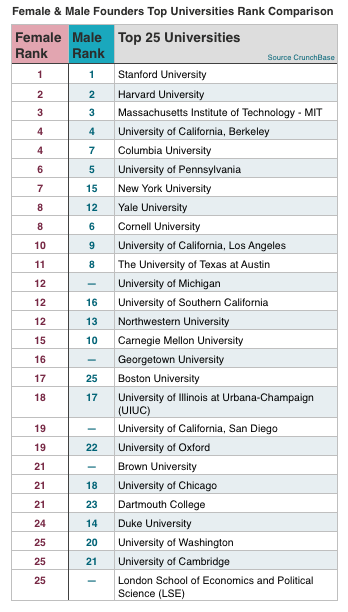
Graduate School and Female Founders
We also looked at advanced degrees among female founders. Our data set shows that 47% have a graduate degree. The most common advanced degree is an MBA, which 19% hold. This tracks closely with data from male founders, 51% of whom have a graduate degree and 21% an MBA.
When it comes to graduate programs, Harvard Business School is clearly the front runner in absolute terms, but taking into account that HBS has more than twice the enrollment of the Stanford business school, the two premier business graduate programs are close in performance.
Business school education, however, does not necessarily trump other graduate degrees. For example, Stanford, Columbia and MIT produced more female founders from non-business advanced degree programs. At Harvard and the University of Pennsylvania, on the other hand, business school graduates outnumber other graduate degrees.
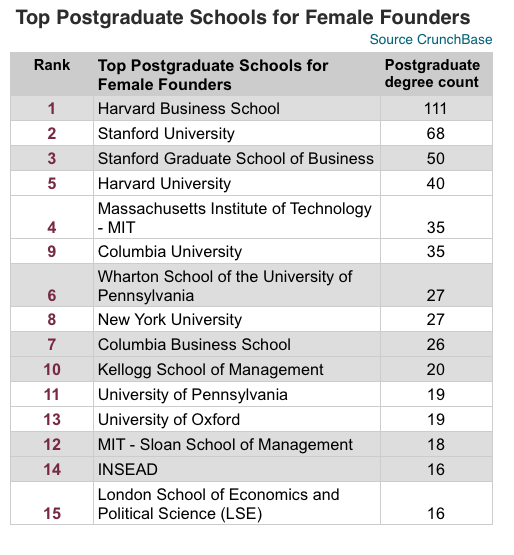
*MBA programs are highlighted
Female Founders and CS, Engineering and STEM Degrees
If graduate level education is roughly comparable for men and women founders, we wondered if there were significant differences in terms of undergraduate majors.
The top degrees for female founders in undergraduate studies are Social Science (30%), Business (18%), and Arts and Humanities (17%), Computer Science (10%) and Engineering (8%). When we sliced the data by STEM subjects (Science, Technology, Engineering and Math) vs other majors, we found 31% of female founders have undergraduate degrees in the STEM core.
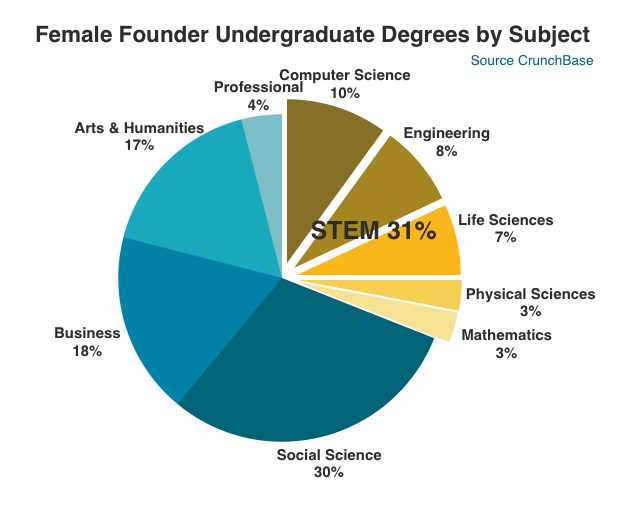
When we contrasted these numbers with male founders, there was a stark difference. Computer science (33%) and engineering (20%) are the top the undergraduate degrees, which means that male founders are three times more likely to have a computer science degree and slightly more than twice as likely to have an engineering degree. From a STEM perspective, fully 63% of male founders have STEM degree, more than twice the percentage for women.
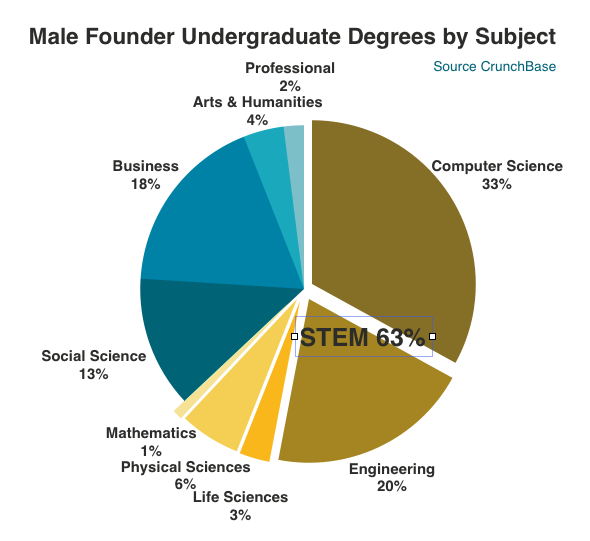
The striking difference in educational backgrounds between male and female entrepreneurs will undoubtedly provoke discussion and a variety of interpretations. It seems reasonable to suggest that CS, engineering and STEM degrees are one strong pre-cursor to tech entrepreneurship, based on what the data shows for male founders. On the other hand, female founders are four times more likely than males to have an arts and humanities degree (17% vs. 4%) and more than twice as likely to have a social science degree (30% v 13%). That may suggest that female founders find entrepreneurial inspiration in ways male founders are less likely to.
It’s obvious that tech startups require technologists, but startups also require highly creative, persistent and insightful leadership, which does not require a technology background. As the number of female founders increases over time, it will be interesting to watch how the comparative educational backgrounds of male and female founders change. The story may be one of convergence: already today 18% of male and female founders study business as undergraduates. Almost certainly the delta that exists in STEM education will shrink, but at the same time, it’s probably wrong to conclude that over time female founders will necessarily conform to their male peers’ educational profiles on the way to becoming entrepreneurs. Whatever patterns emerge, that story will be remarkable to watch.
CrunchBase will continue to improve and mine the data around female founders and education. We recognize that this effort just scratched the surface. Please ask your questions and add observations in the comments below.
On the Data –
-
The data in CrunchBase is sourced from the community, data partners and our own data teams. We have missing data in CrunchBase, companies without founders and founders without their degree information. For the female founders 1% were missing degree information. We improved this data with our own research to help improve accuracy. For male founders, 22% were missing degree information. We made no improvements in this data because the data set for men is much larger and (we hope) more statistically valid, despite gaps.
-
When we weighted this analysis by enrollment numbers, from the National Center for Education Statistics (NCES) , we found that the ranking shifted. Stanford tops the list, with MIT in the second spot, and Harvard third. Yale and Dartmouth round out the top 5, beating out Berkeley and Columbia.
